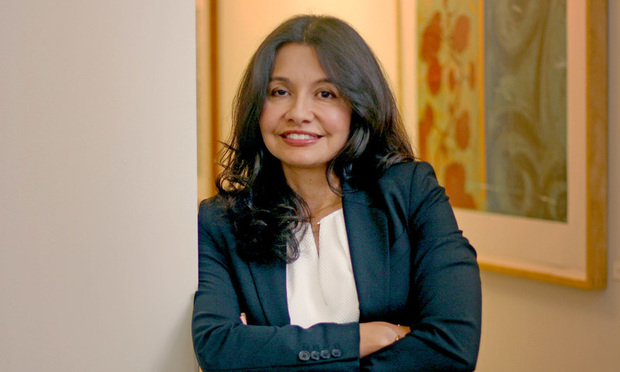Big Law Partner Wants Miami Firms to Focus on Global Legal Markets
A Big Law partner believes Miami law firms can do more to improve their share of global business.
October 22, 2018 at 03:17 PM
5 minute read
 Lida Rodriguez-Taseff. Photo: J. Albert Diaz/ALM
Lida Rodriguez-Taseff. Photo: J. Albert Diaz/ALM
Diversity is on the tips of everyone's tongues. It's become an issue at the forefront of the United States' cultural and political conversations, the media and legal profession.
But in Miami, a city brimming with people from different backgrounds and walks of life, some attorneys say the lack of diversity among law firms is holding the region back.
Among those raising their voices is commercial trial lawyer and former ACLU Miami chapter chairwoman Lida Rodriguez-Taseff, who calls for a less “insular” legal sector. Never one to bite her tongue, Rodriguez-Taseff has tackled problems at the voting booth and discrimination on the federal bench.
Justice Watch: Legal Community Puts Pressure On Rubio To Stop Blocking Judge
“I think it would be foolish to believe that the legal industry isn't going through the same growing pains,” she said. “I've seen firms deal with it well and become more diverse and inclusive, and I've seen others do not as well. I've been fortunate enough to be at firms that are grappling as well as they can with diversity and inclusion.”
But now, Rodriguez-Taseff would like to see Miami's entire legal sector broaden its reach by bolstering its ranks.
“With the exception of a few shining examples like DLA Piper, Miami really needs to improve on thinking bigger, more globally, more internationally,” she said.
After spending 19 years with Duane Morris, Rodriguez-Taseff left the firm to join DLA Piper in July. She says the move was inspired in part by an increasingly global client base.
“DLA's platform made absolute sense for me. It is a global, outward-facing law firm that is interconnected across the world,” Rodriguez-Taseff told the Daily Business Review. “[DLA] is a global powerhouse in a market like Miami, where what is needed are folks that are outward looking.”
A key step: diversifying big law firms.
“The bigger the thinking, the more international and more global the opportunities will be,” she said. “In order for the Miami legal market to lead, its weightiness needs to seen by the world. Miami becomes more weighty when its legal market becomes more diverse, more global, and more focused on the things that are important to corporations and individuals that conduct business around the world.”
She added: “Cultural awareness, linguistic diversity and cultural sensitivity is key to successfully navigating international business, and once the Miami legal market really learns to appreciate the value of that, it will be able to attract better work.”
However, other attorneys look at the state of Miami law as it pertains to diversity and professionalism and see a market that outpaces other metropolitan areas in the United States.
“If I had to measure our experience with litigation in Texas, New York and California, I will tell you that the Southern District of Florida to [my firm] has always been much more impressive in the sense of its care for ethical rules and professionalism between counsel,” said attorney Jorge Espinosa.
 Jorge Espinosa, managing partner with Espinosa Martinez in Miami.
Jorge Espinosa, managing partner with Espinosa Martinez in Miami.Espinosa, managing partner with Miami law firm Espinosa Martinez, conducts trademark litigation both domestically and internationally. In conversation with the Daily Business Review he asserted three prongs for assessing diversity efforts in legal communities.
“When we talk about diversity we really should look at it in three ways,” Espinosa explained. “One, are established firms bringing women and minorities into the firm? Are women and minorities employed by firms? Two, are they able to start their own firms and prosper? And three, are they integrated into the judiciary side of it?”
According to Espinosa, the Southern District of Florida has become much more diverse since he began practicing law in the early 1990s.
“We certainly have a large number of Hispanic-owned firms. I think we could do better with regards to woman-owned firms and certainly non-Hispanic minority-owned firms,” he said. “A lot of the larger firms in South Florida have done quite well to integrate minorities and women into their ranks … So maybe I don't see it, but I don't think South Florida fares badly relative to other parts of the country in that regard.”
Espinosa stated that one of the things holding Miami back from being an international legal player in accordance with its status as an international city is a lack of companies headquartered in the Magic City.
“We don't have R&D on the scale that they have in New York City, Los Angeles, Orlando … so you don't see the giant companies that generate work,” he said, contrasting Miami against the likes of San Francisco's industrious corporate landscape.
Ultimately, both Rodriguez-Taseff and Espinosa believe there's always room for growth and improvement.
“There is an opportunity for South Florida to be a top-tier international legal market,” Rodriguez-Taseff said. “And the opportunity begins with globalizing our local legal market.”
Related stories:
Focus on Inclusion Feed Minority, Gender Diversity at Law Firms in Florida
Tampa Lands Baker McKenzie Back-Office Operations, 300 Jobs
GCs Dish About Their Law Firms: Would You Like What You Hear?
New Report Finds Female Path to Law Firm Partnership a Sluggish Crawl
This content has been archived. It is available through our partners, LexisNexis® and Bloomberg Law.
To view this content, please continue to their sites.
Not a Lexis Subscriber?
Subscribe Now
Not a Bloomberg Law Subscriber?
Subscribe Now
NOT FOR REPRINT
© 2025 ALM Global, LLC, All Rights Reserved. Request academic re-use from www.copyright.com. All other uses, submit a request to [email protected]. For more information visit Asset & Logo Licensing.
You Might Like
View All

'So Many Firms' Have Yet to Announce Associate Bonuses, Underlining Big Law's Uneven Approach
5 minute read
Elite Boutiques Competing More With Big Law Bonuses, With Several Going Above Market
9 minute read
Steptoe Offers Associates New Flexible Billable Hour Tracks in Revamped Comp System
4 minute readTrending Stories
- 1'A Death Sentence for TikTok'?: Litigators and Experts Weigh Impact of Potential Ban on Creators and Data Privacy
- 2Bribery Case Against Former Lt. Gov. Brian Benjamin Is Dropped
- 3‘Extremely Disturbing’: AI Firms Face Class Action by ‘Taskers’ Exposed to Traumatic Content
- 4State Appeals Court Revives BraunHagey Lawsuit Alleging $4.2M Unlawful Wire to China
- 5Invoking Trump, AG Bonta Reminds Lawyers of Duties to Noncitizens in Plea Dealing
Who Got The Work
J. Brugh Lower of Gibbons has entered an appearance for industrial equipment supplier Devco Corporation in a pending trademark infringement lawsuit. The suit, accusing the defendant of selling knock-off Graco products, was filed Dec. 18 in New Jersey District Court by Rivkin Radler on behalf of Graco Inc. and Graco Minnesota. The case, assigned to U.S. District Judge Zahid N. Quraishi, is 3:24-cv-11294, Graco Inc. et al v. Devco Corporation.
Who Got The Work
Rebecca Maller-Stein and Kent A. Yalowitz of Arnold & Porter Kaye Scholer have entered their appearances for Hanaco Venture Capital and its executives, Lior Prosor and David Frankel, in a pending securities lawsuit. The action, filed on Dec. 24 in New York Southern District Court by Zell, Aron & Co. on behalf of Goldeneye Advisors, accuses the defendants of negligently and fraudulently managing the plaintiff's $1 million investment. The case, assigned to U.S. District Judge Vernon S. Broderick, is 1:24-cv-09918, Goldeneye Advisors, LLC v. Hanaco Venture Capital, Ltd. et al.
Who Got The Work
Attorneys from A&O Shearman has stepped in as defense counsel for Toronto-Dominion Bank and other defendants in a pending securities class action. The suit, filed Dec. 11 in New York Southern District Court by Bleichmar Fonti & Auld, accuses the defendants of concealing the bank's 'pervasive' deficiencies in regards to its compliance with the Bank Secrecy Act and the quality of its anti-money laundering controls. The case, assigned to U.S. District Judge Arun Subramanian, is 1:24-cv-09445, Gonzalez v. The Toronto-Dominion Bank et al.
Who Got The Work
Crown Castle International, a Pennsylvania company providing shared communications infrastructure, has turned to Luke D. Wolf of Gordon Rees Scully Mansukhani to fend off a pending breach-of-contract lawsuit. The court action, filed Nov. 25 in Michigan Eastern District Court by Hooper Hathaway PC on behalf of The Town Residences LLC, accuses Crown Castle of failing to transfer approximately $30,000 in utility payments from T-Mobile in breach of a roof-top lease and assignment agreement. The case, assigned to U.S. District Judge Susan K. Declercq, is 2:24-cv-13131, The Town Residences LLC v. T-Mobile US, Inc. et al.
Who Got The Work
Wilfred P. Coronato and Daniel M. Schwartz of McCarter & English have stepped in as defense counsel to Electrolux Home Products Inc. in a pending product liability lawsuit. The court action, filed Nov. 26 in New York Eastern District Court by Poulos Lopiccolo PC and Nagel Rice LLP on behalf of David Stern, alleges that the defendant's refrigerators’ drawers and shelving repeatedly break and fall apart within months after purchase. The case, assigned to U.S. District Judge Joan M. Azrack, is 2:24-cv-08204, Stern v. Electrolux Home Products, Inc.
Featured Firms
Law Offices of Gary Martin Hays & Associates, P.C.
(470) 294-1674
Law Offices of Mark E. Salomone
(857) 444-6468
Smith & Hassler
(713) 739-1250






